
Sacred knowledge and sustainable water–human relations.
As we grapple with the pressing issues of water management and its impact on ecosystems, economies, and societies, this conference seeks to explore a transformative perspective. Can diverse religious philosophies and practices offer lessons for sustainable water use? How can sacred knowledge inform water regulation, challenge existing legal frameworks, and raise public awareness about water scarcity?
Sustainability may require a reconceptualisation of water and an unlearning of the anthropocentric language of goods, services, and economic value. Can we turn to forms of sacred knowledge, old and new, to think water ‘otherwise’, as a way out of the global grip of consumerism, expressed through a pervasive utilitarian perception of the world, in which water is but an instrumentalised resource to be efficiently extracted and absorbed? Could religious orientations, in their diversity, offer us conceptual and practical tools of being with water beyond ‘usage’ and ‘efficiency’, in ways that do not progressively deplete the earth and impoverish all that it holds?
Rituals, scriptures, and context-specific religiosities locate different answers to these questions, and so this conference invites ethnographic, theological, and historical analyses of water-human relations from across the world. Various studies have already portrayed waterworlds in which the human/nonhuman distinction is ungrammatical, in which the bodies of water have various agentive qualities, or come into focus as animate beings, in which water not only traverses political and religious boundaries but connects all domains of the social. Is a reparative genealogy of such connections, on a global scale, an appropriate answer to an already global anthropogenic environmental injury?
Being with Water Otherwise is a two-day conference organised by the Cambridge Interfaith Programme (CIP) in the University of Cambridge’s Faculty of Divinity. It is aligned with CIP’s involvement in the Ofwat-funded project Water efficiency in faith and diverse communities.
The conference will include a keynote address from Professor Veronica Strang (Oxford), thematic panels, a Scriptural Reasoning session, and a combined book launch of recently published volumes on water and religion.
View the complete programme and register.
Keynote | Divine Alternatives: water beings and their transformational potential in human-non-human relations
Professor Veronica Strang FAcSS
ABSTRACT:
Expressing the ‘Nature worship’ that prevailed in early human societies, serpentine water deities swim in the deep history of religious systems around the world. Though culturally and historically specific, these powerful figures also reflect the consistent materialities of water and its essential role in sustaining life.
Water beings remain important in many place-based communities, exemplifying their egalitarian partnerships with the non-human domain. However, the fortunes of non-human deities in larger societies illustrate critical changes in human-environmental relations, showing how technological developments and growing human instrumentality, coupled with the emergence of religious and political hierarchies, have led to exploitative and unsustainable trajectories of environmental engagement.
Describing the findings of a major comparative study of water beings around the world (Strang 2023), this lecture illuminates an intriguing pattern of religious transformation. In many larger societies, serpentine water deities were semi-humanised, and then entirely humanised, or displaced by divinities in human form. With the rise of the major monotheisms, ‘Nature’ was alienated and feminised, supreme male Gods appropriated the role of controlling and supplying water and, in the assertion of human dominion, many long-venerated serpent beings were demonised and slain.
The lecture proposes that these religious transformations reflect widening inequalities within societies and between human and non-human beings. It observes that today, in personifying and communicating the creative agency of the world’s most vital element, water divinities provide an alternate model: a way to rethink contemporary distributions of power and the way that humankind engages with water and ecosystems.
About the Keynote speaker:

Veronica is a cultural anthropologist whose work is concerned with human-environmental relations, in particular societies’ engagements with water.
She has worked at the Pitt Rivers Museum and Oxford University’s Environmental Change Unit; the University of Wales; Goldsmiths University; the University of Auckland, and Durham University, and has served as the Chair of the Association of Social Anthropologists of the UK and the Commonwealth.
In 2000 Veronica received a Royal Anthropological Institute Urgent Anthropology Fellowship, and in 2007 she was awarded an international water prize by UNESCO. In 2019 she was elected as Fellow of the Academy of Social Sciences.

Her publications include The Meaning of Water (2004); Gardening the World: agency, identity and the ownership of water (2009); Ownership and Appropriation (2010); Water: nature and culture (2015) and Water Beings: from nature worship to the environmental crisis (2023).
Further details are available on her website: veronicastrang.com
Further information
View the full programme including abstracts and speaker biographies.
Registration is possible until midnight on Monday 15 April. There is a £50 fee (standard) with £20 concessionary rate for local and/or low income delegates.
Academic coordinator: Dr Safet HadžiMuhamedović.
